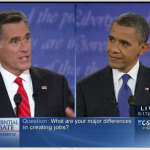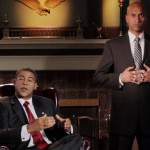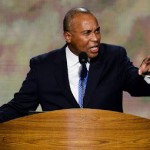White Rage, Black Obama
Reflections on the DNC: Part 2
The hysteria that characterizes these commotions [Tea Party rallies against President Obama] convinces me that the current American political scene, so heavy with anxiety and unhappy conscience at the moment, is riper now for psychoanalytic inquiry as an efficacious human science than it has ever been…
—Hortense Spillers, “Destiny’s Child: Obama and Election ’08” boundary 2 39:2 (2012), p. 9.
Suddenly this whole election feels very strange. I’ve been seeing mainstream pundits and writers talking about how Obama should be more aggressive, even advising him to be the “angry Black man,” toward Mitt Romney. At any other moment, this would be like telling the president to put on deer antlers when Dick Cheney is hunting nearby. Often enough, our supposed anger toward white people is used as a convenient excuse for killing us or locking us up, and giving our killers paid vacations. But now, with white middle class political concerns on the line, a society that has never had positive uses for Black anger is soliciting it. It would seem, at least for the next 10 days, that this society has at least one job for an “angry Black man.” What’s going on?
It’s almost like that sketch on Comedy Central’s Key and Peele, where Obama hires an anger translator, Luther, “just so there’s no more confusion.” Of course, there is more confusion than ever. Key and Peele’s Obama sharply chastises Luther—”Rope it in!” and “I did not say that!”—whenever Luther’s (or is it really Obama’s?) anger threatens to call attention to how similar Obama is to other Black people—or, at least, to what Comedy Central viewers find believable about Black people.
It’s an imaginative joke, for sure, even if at times somewhat buffoonish. But the character Luther, however implausible, indexes a real public obsession with Obama’s inner life, especially his anger, and a desire to condense it into one fungible body. Even though the character of Luther is the creation of two Black men, it is evident that they pieced it together out of a more widespread and pre-existing fascination with blackness in the collective American psyche. People are drawn to the characters in the sketch because Obama, the real-life president, is still very much a mystery to most Americans, even those on the left.
This increased interest in Black psyches is not new, but it is a consequence of Obama’s presidency that is unlikely to turn out well for Black people or Black freedom struggle. And in this election year, we can really see why. The ease with which this interest is discussed really showcases both our utility as America’s neo-slaves and the ongoing utility of our emotions. Not only does the figure of the “angry Black man” remain a central one in the collective white psyche of the US slave estate. But the psyches of all Black people have also become specimens under the gaze of the collective (white) unconscious. That is why to see so many Black liberals chime right in with the white liberal interest, without really raising the level of conversation, is really disconcerting. It’s actually kinda jacked up. This moment of attention to Black anger is not generally occurring among those who claim to be interested in our mental health. Those people, if their interest in our mental health is genuine, might be radicalized once they realized how toxic America itself is to Black health of any kind. But during these debates, most of the interest in the “angry Black man” has been among those who root for the figure of the “angry Black man” as a kind of political sports commodity or video game icon.
“Where Was Obama Tonight?”
Case in point: By the end of the first debate, with 10 million tweets having flown over the previous 90 minutes, Chris Matthews and Ed Schultz of MSNBC found themselves at a loss for polite speech about the president. Sounding like men at the track whose favored horse turned out to be an “also-ran,” they were damn-near apoplectic. The fault, of course, was Obama’s debate performance. And the angry speech of these two white men quickly descended into random associational ramblings. Matthews ranted for over two minutes straight, “Where was Obama tonight?”, and twice interrupted Schultz, who was trying to agree with him that Obama was “totally off his game.” He should have attacked more, they said. He should have interrupted Romney with fact checks. They couldn’t contain their anger at how the Republican had walked all over their guy, the reigning champ and, up to that moment, the one favored to win it all. Someone at MSNBC might have been reading Ta-Nehisi Coates, not to mention their own contributors, like Jonathan Capehart and Melissa Harris-Perry. Capehart has for years been circulating the idea that Obama’s emotional state— or let’s call it affect—was part of the coolness demanded by Black life in America.
It didn’t take long to call up the figure of the “angry Black man,” a racist stereotype and perhaps the all-time leading boogeyman among US political symbols. Schultz took up this figure, saying, “It was very frustrating to watch a guy [Romney] lie to the American people and not be counterpunched because we are afraid [Obama is] going to be called an angry black man.” Of course, Schultz’s frustration arises from someone who doesn’t know a fucking thing of what it’s like to be labeled an “angry Black” person.
Very soon, however—perhaps once they were hip to the optics of white people demanding that a Black person get more angry toward a white person—MSNBC began ceding this particular line of critique to Black commentators. By the time Now with Alex Wagner aired, the outrage at Obama was allowed to have a Black face, Michael Eric Dyson, who took over the “fear of an angry Black man” line. And, to my knowledge, it has been a discussion carried on mostly by Black commentators since then.
But discussions of blackness in the mainstream press, even by Black people, are almost always quite vapid and self-policing—”roped in,” if you prefer. And no mainstream writer has gone on to indict the absolutely essential role of the US slave estate and the modern world in creating—and then punishing—Black anger. Even before Huffington Post published “It’s Time for Obama to Become the ‘Angry Black Man,’” the “angry Black man” as a figure was already there in Schultz’s words and Matthews’ rage.
And so it was that some liberal writers encouraged a Black man’s anger, the one thing America absolutely must repress unless it’s going to recognize itself as the racist society it is. What a coup, right? The figure of the “angry Black man,” which is so often the rationalization for police firing squads and the poster boy of campaigns to send Special Forces to Africa, was actually summoned. And why? Not for his mental health. Not to figure out what conditions would have to change that he might not be angry. Not for the mental health of Black women or children. Not for our health as Black people. The “angry Black man” has been called up from the bullpen on behalf of white desire and political interest.
Well of course, one might say. Constituents are supposed to get angry when their representatives don’t have backbone enough to fight for them. That is true. But that is also extremely myopic. Unless the USA is planning on investing in Black anger as some sort of renewable energy, what’s going on when the mainstream media manipulates the affect of Black anger? The “angry Black man”—which is actually, an angry Black person— when understood not to be a stereotype but an actual person—comes from a place of great pain. But unlike others’ political anger—say, that of the “angry white man” of the 1994 and 2010 elections—the anger of actual Black people is never allowed to ground legitimate political demands and movements for Black people’s interests. When it does, those movements go down in history as illegitimate “threat[s] to the internal security of the United States.” Our interests are delegitimized before we can even articulate them.
Being for the Captor
And this is most apparent at the national political level, which really allows some striking demonstrations of how fungible Black affect is. At the Democratic National Convention in Charlotte, both the most passionate speeches and the most rhetorically repressed sets of demands were those of Black people. I have written before about how nothing immediately pertinent to Black people’s survival held a central place in the speeches and caucuses I attended at the DNC. I don’t think this was a coincidence. It’s not that Black people were the only ones whose priorities and agenda were being shortchanged, or even that ours were the most shortchanged. But the convention, dominated by Black speakers and at a historical moment when Black people are suffering and dying not merely disproportionately but specifically because we are Black, refused to pay sustained attention to poverty, one of the defining characteristics of Black life in the USA and the world. With few exceptions, when poverty was mentioned, it was something temporary, like the poverty of Julian and Joaquin Castro’s immigrant grandmother Victoria, who sacrificed so that their family would eventually arrive in the US middle class. For some reason, on the national political scene, family immigration narratives are assumed to have happy endings. Hence, such upwardly mobile poverty shows up in mainstream politics as a “deserving” kind of poverty on the US political landscape. And why is immigrant poverty “deserving”? Mostly because US immigrants are imagined not to be Black. The deep and persistent kind of poverty that defines Black and Brown life in the Americas was barely mentioned, if at all.
And so even with a disproportionate number of energetic primetime DNC speakers being Black—including Donna Brazile, Michelle Obama, Deval Patrick, Cory Booker, Anthony Fox, and Barack Obama—nobody was speaking of a Black agenda. The closest we got was the women’s agenda, the workers’ agenda, the immigrant rights agenda, and, of course, the all-important middle-class agenda. The repression of Black demands occurred in the same physical space as the hypervisibility of Black speakers, Black delegates, and Black vernacular styles, and, as always, the ubiquitousness of Black music. This speaks to a nationwide willingness to use our affects for everybody else, but not for us. And it was very telling, not only about how little the electoral process has to offer us, but also about how useful—even necessary—our affect is as a commodity in the electoral process.
Gov. Patrick’s passionate, Black-church-meets-union-hall style speech actually managed to be one of the few speeches of the entire convention that hinted in any kind of sustained thematic way at the systemic, transgenerational poverty known to affect Black and Brown people disproportionately. But even as our suffering was evoked, Black people’s political desires were kept in check. Patrick didn’t mention that the school he referenced, Orchard Gardens, is located in Boston’s historically Black Roxbury section. Patrick did, however, mention that a large number of youths at the school have parents who struggle with English. That’s an important signifier to drop into the speech. It doesn’t just mark a language barrier. Because Black people aren’t imagined to be immigrants, it also marks the school’s kind of poverty as a “deserving” kind of poverty, like the one built into immigrant narratives like that of Mayor Castro. And then, only after he had mentioned that, did Patrick proceed to mention other things (lack of grocery stores and banks, for instance) that signify the entrenched poverty and racial segregation known to afflict many Black communities, generation after generation. The school to which he referred is also one of the controversial “turnaround” schools, where the state took over, fired 80% of the staff, and implemented other drastic changes that emphasized immediately verifiable results. Despite Patrick’s much-vaunted passion, the signifiers of blackness in his speech were ones of style (the rhetorical tropes he used, the energy with which he spoke) and not substance. That energy is not for the Black people whose suffering he quotes from and masks.
Doth Protest Too Much
So—and this thought is based on Jared Ball’s new book— the way it seems to work is this: Black affect arises from Black suffering, and then white state and civil society harvest Black affect, the fruits of that suffering, through things like Black music, Black electoral enthusiasm, and other forms of Black performance (including signifiers of Black criminality, showcased every night at 6 and 11). White state and civil society then take these, in turn, and use them to re-create the same and new conditions of Black suffering. And so it goes. So maybe it was predictable that we Black folks inside the halls of the DNC kept on being the party’s number one cheerleaders, allowing the commodity of our affect to be circulated on all kinds of causes, except our own unique challenges to biological survival. Our energies swerved and careened all around the figure of “the Black”—angry or not. This figure, who was at the center of the whole affair, was also banished from the halls. The intensity with which most Black DNC attendees cheered and defended Obama seemed to be our only concession to blackness. The intensity might have been even more enthusiasm than many people actually felt because it had to disavow the vague sense that Obama hasn’t actually done much to address the unique and urgent problems Black people face. In that intensity was an enunciation of an intense pain, a robust longing that had to be strained through the constricting demands of white liberals. Like the demand for Obama’s “angry Black man” to magically appear in the debates for their own ends, the DNC’s employment of Black affect while it conceded nothing to Black demands is another example of how Black people are still caught up in the chains of white affective interests, still the fungible commodities we have always been.
As Hortense Spillers says in the article quoted in the epigraph, there is an intensity and duration to the anti-Obama racist protests. It demands that Black intellectuals (and not just those in the academy) take up a special set of methods— a psychoanalytic way of thinking about racial blackness in the US collective unconscious. In my view, this begins as a careful attentiveness to speech and performance. These are symptoms of a vast and concealed world of desires and aversions, both individual and collective. Such a psychoanalytic listening shows us that an individual like Obama does not create her or his own psyche, as though she or he somehow exists outside of a racist social structure. So if you really want to understand the “angry Black man” —or, better still, the anger of Black people—it’s about more than just looking at Obama’s cool temperament and using it to further pathologize Black people. And it’s certainly about more than treating his repressed anger as some buried black gold to be fracked up so non-Black people can articulate their political demands. It’s more about seeing Obama through the lens of a fundamentally antiblack society and global order. In doing so, one will be looking at oneself, too. And if one is sincere, one will have to act on the social structure, to make real, radical change.





0 comments